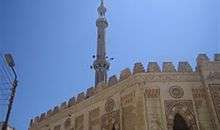Ayadh bin Ghanim
Ayadh bin Ghanim bin Zuhair bin Abi Fihri Shaddad al-Qurashi (Arabic: عياض بن غانم بن زهير بن أبي شداد الفهري القرشي) was a member of Quraish tribe during the time of the Islamic prophet, Muhammad and prominent military figure in Rashidun caliphate.
Life
He is one of the earliest Sahabah who became Muslim and saw Battle of Badr, Battle of the trench and Hudaybiyah treaty. participated in many battles in Levant, including the Dawmat al-Jandal and later Battle of Yarmouk and later sent as commander by Abu Bakr to Jandal, as it was on the command of the infantry in the Battle of Fahlalthough another source said he was on charge of cavalry while Sharjeel bin Hasanah who led the infantry.[1] Later he also involved in the siege of Damascus, and was at the forefront of Abu Ubaidah ibn al-Jarrah Army to Aleppo 16 Hijri year or 637 AD year served as the Governor of Jazira(Upper Mesopotamia) for some time.
at the time of caliph Umar he accompany Khalid ibn al-Walid in the conquest of Armenia.[2] Later he was transferred to Egypt.
Letter of Umar
One day a Bedouin came to Umar and said, "Umar, beware of the fire of hell." Umar enquired what was the matter. The Bedouin said, "You have enjoined upon your Governors to lead a simple life and be accessible to the people at all times. But do you know that Ayad your Governor of Egypt is living a luxurious life and he is not accessible to the people." Umar noted the complaint and assured the complainant that suitable action would be taken thereon. He deputed an agent to Egypt to verify the complaint. He instructed further that if the complaint was correct, Ayad should be summoned to Madina. On reaching Egypt the agent deputed by Umar felt satisfied that the Governor dressed himself in fine clothes, and that he was not easily accessible to the public. The emissary of Umar accordingly summoned Ayad to Madina. When Ayad was presented to Umar, the latter could not recognise him. When he was told that he was in fact Ayad, he said: "When I sent you as Governor you were neither so white nor so fat as you are now. Prima facie you have abused your position." Umar asked him to take off his fine clothes, wear the dress of a shepherd and look after the goats of the Baitul Mal in the State pasture. Iyad complied with the order. A few days later Umar went to the State pasture and enquired of Ayad as to how he felt. Iyad said, "My father was a shepherd, and I feel no humiliation in following in the footsteps of my father." Thereupon Umar said, "If that is so, it means that your conscience is not guilty. I have checked your accounts and these have been found in order. You are not corrupt but you have indulged in luxury. You became arrogant because of the office held by you. I hope you are now rid of your pride and arrogance. What sort of man will you be if I send you back to your office." Ayad said, "I have no desire for the office, but if that is your command, I will do as you ordain." Umar said, "That is well said. I order you to resume charge as the Governor of Egypt. Dress yourself as a simple man and avoid wearing Egyptian finery. Let there be no guard at your door, and see that you are accessible to the people at all times." Ayad said, "The orders of the Caliph still be complied with strictly." Ayad returned to Egypt, a changed man. He strictly complied with the orders of Umar both in letter and spirit. Later Ayad returned to Egypt. He strictly complied with the orders of Umar both in letter and spirit.[3]
Ayaz walked to the island in August the year 18 AH, in five thousand of Muslims, came to an end vanguard to tenderness, and raided the present was around he asked her family the peace and safety, wrote Ayaz era so and then open Harran and Edessa and Samosata and Nusaybin and Miafarkin and Kerkasia and villages of the Euphrates and its cities and then open Manbej Tel Muizn and Amed and Fort Totha and Fort Mardin and Dara year 19 AH / 640 AD, and the island nation is the easiest and easiest groundbreaking said Ayaz in that:
Of the amount of the clans that Jmuana
Whale on the island of crowds
Rounded the island and Algeatt Venfssoa
Homs who he is away Akaddam
The dearest and Distinguished Muasher
Broke up the island for the important chicks
Death
His death was recorded in year 641 AD[4]
Legacy

Sidi Ghanim Ash'ari Mosque which located in city of Baltim, village of Al-Mansour in Egypt[5] was built in memoir of him
Further reading
- Ibn al-Atheer, full of history, achieving Omar Abdel-Salam destruction (Arab library 0.1417 AH / 1997 AD).
- 'Al-Baladhuri, Fattouh countries, (publication of the university House, 1957).
- 'Mohammad Reza, Farooq Omar bin al-Khattab the second caliph (Beirut 1398/1987).
Notes
- ↑ Ghadanfar, Mahmood Ahmad (6 November 2016). "Commanders Of Muslim Army". Darussalam Publishers – via Google Books.
- ↑ Haykal, Muḥammad Ḥusayn (1990), Al-Faruq, 'Umar, Dār al-Maʻārif Publishers, ISBN 977-02-3092-8
- ↑ "Khalifa Umar bin al-Khattab - Inter-Personal Relations and Interactions - Alim.org".
- ↑ "البحوث - الموسوعة العربية".
- ↑ http://wikimapia.org/5399965/ar/مسجد-سيدي-غانم-الاشعري